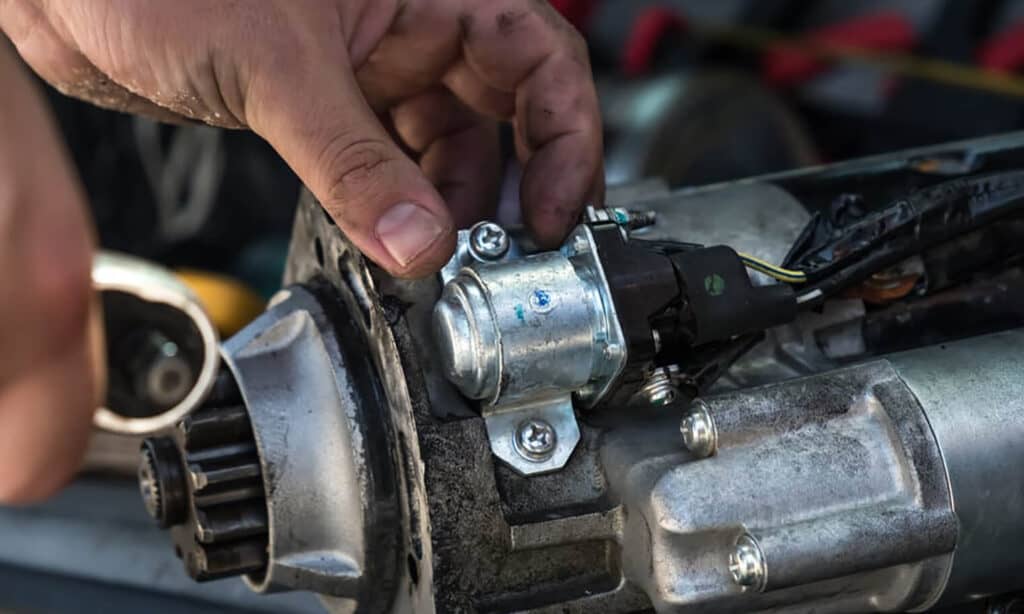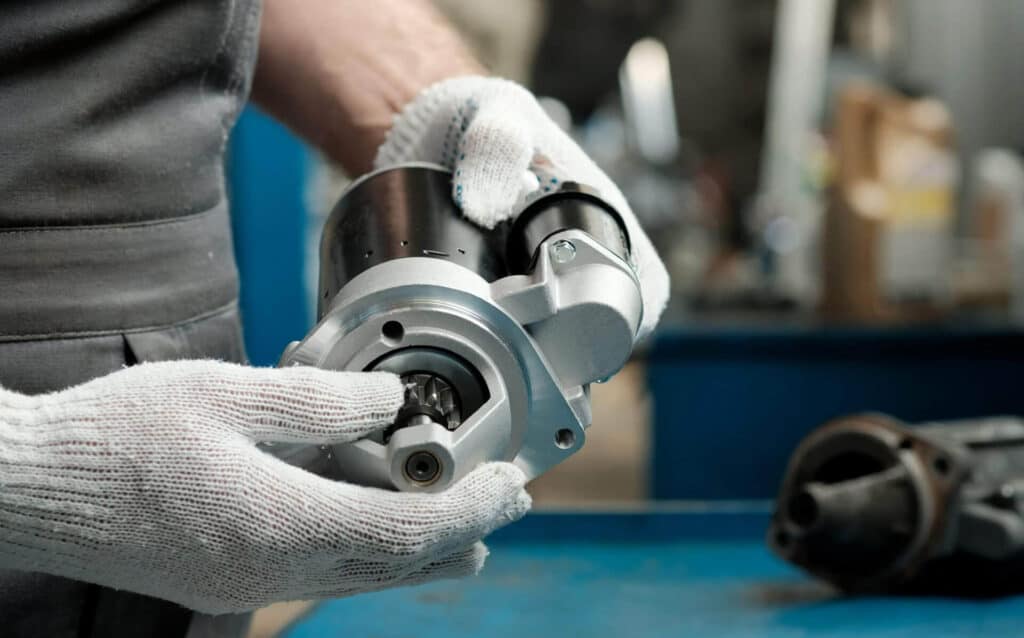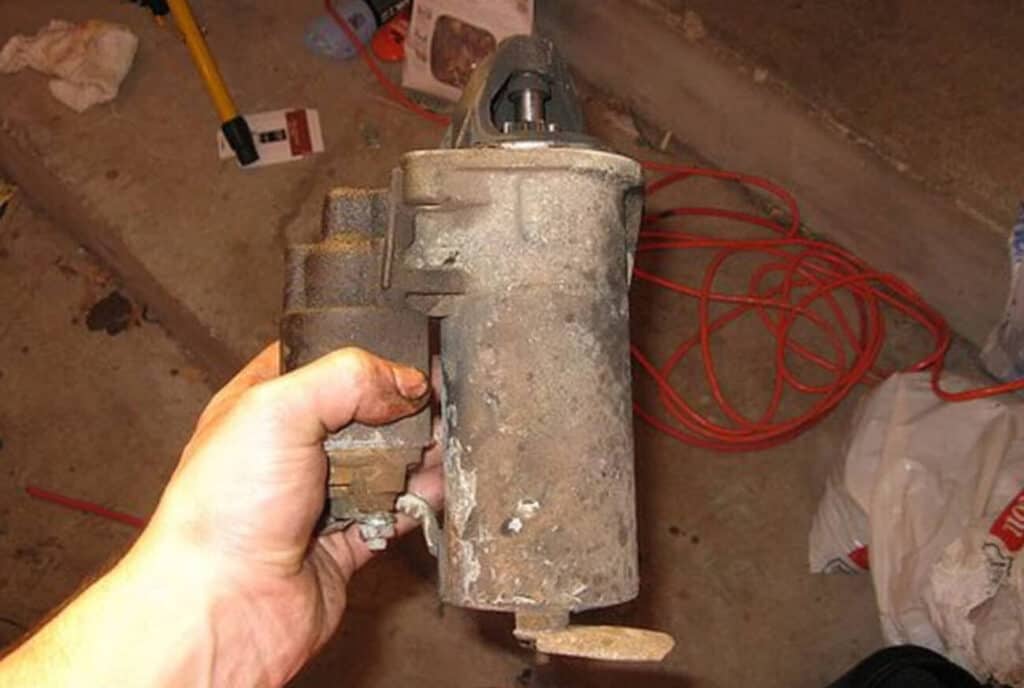Starter motors play a crucial role in igniting your vehicle’s engine, setting the stage for all subsequent operation. These complex pieces of machinery are designed to be robust, but like all mechanical components, they are not immune to failure. Starter motor failures can sometimes seem sudden, but they are often preceded by warning signs. This article aims to enhance your understanding of starter motor failures and equip you with knowledge to identify, diagnose, and address these issues.
The Lifespan of a Starter Motor: What You Should Expect
So, how long should a starter motor last? The answer varies depending on several factors, including the type of vehicle, its usage, and maintenance.
To give a ballpark figure, a starter motor typically lasts between 48,000 to 320,000 kilometers. This broad range translates to an average lifespan of about 7 years, given typical driving conditions and maintenance schedules. However, it’s worth noting that this is just a median value, and many starter motors, especially those in well-maintained vehicles, can last significantly longer.
For instance, if your vehicle is primarily driven on highways or in rural areas where starts are infrequent, your starter motor’s lifespan could extend towards the upper end of this range. Conversely, if your vehicle is mostly used in urban areas, involving many starts due to stop-and-go traffic, your starter motor might lean towards the lower end of the lifespan spectrum.
Maintenance also plays a key role in the lifespan of a starter motor. Regular servicing of your vehicle ensures that potential issues are flagged and fixed before they cause substantial damage. For example, keeping your vehicle’s battery in good shape is vital, as a weak battery can put additional strain on the starter motor, leading to premature failure.

Identifying Common Causes of Starter Motor Failure
A starter motor is a key part of your car, but sometimes it can stop working. There are many reasons why a starter motor may fail. Understanding these reasons can help you take better care of your vehicle. Here are the most common causes of starter motor failure:
1. Electric Problems: The starter motor is part of your vehicle’s electrical system. It needs a good battery and good connections to work properly. If your battery is weak or old, it might not provide enough power for the starter motor. This can make the motor work harder and can cause it to fail. Also, if there are issues with the vehicle’s wiring – such as frayed wires or loose connections – this can stop the starter motor from getting the power it needs. Always make sure your battery is in good condition and your vehicle’s wiring is checked regularly to prevent these issues.
2. Bad Starter Solenoid: The starter solenoid is a very important part of the starting system. It controls the electric current that goes from the battery to the starter motor when you turn the key to start the car. If the starter solenoid is damaged or worn out, it won’t be able to control this current. This can stop the starter motor from working. Regular checks of the starter solenoid can help spot problems early.
3. Oil Leaks: If your vehicle has an oil leak, this can be very bad for the starter motor. The oil can get on the motor and cause damage. Over time, this can make the motor fail. If you notice any signs of an oil leak – such as oil spots under your car or a drop in oil level – get it checked right away.
4. Wear and Tear: Just like any part of a car, the starter motor can wear out over time. This can happen faster if you drive your car a lot or in difficult conditions. Regular maintenance can help reduce wear and tear and keep your starter motor working for longer.
By understanding these common causes of starter motor failure, you can take steps to keep your starter motor in good condition. Regular maintenance and checks of your vehicle can help spot any potential problems early and keep your starter motor working as it should.
Warning Signs: Symptoms of a Bad Starter Motor
Starter motor problems? How do you know? Here are some warning signs to look out for. These signs can help you catch problems before they get worse.
Noise: One of the first signs might be a strange noise. If you hear a grinding noise when you try to start your car, this could mean there’s a problem with your starter motor. This sound is very similar to a bad flywheel ring gear, a part that helps your engine start. It’s not a nice sound! Imagine metal grinding against metal. If you hear this, it’s important to get your car checked right away.
Freewheeling: This is another sign of a bad starter motor. When you turn the key to start your engine, you might hear a whining noise, but the engine does not start. This is called freewheeling. It’s like your car is trying to start, but it just can’t. This is a very clear sign that there’s a problem with your starter motor.
Smoke: Smoke is never a good sign. If you see smoke when you try to start your car, this could mean your starter motor is overheating. This usually happens when the starter motor is being overworked, and it’s a very clear sign of a problem. If you see smoke, it’s important to turn off your engine and get your car checked right away.
Oil-soaked starter: If you see oil around your starter motor, this could be a sign of a problem too. This could mean there’s an oil leak, which can damage the starter motor. Oil and electricity are not a good mix! If you see oil, it’s time to get your car checked.
So, remember: strange noises, freewheeling, smoke, and oil are all signs of a bad starter motor. If you see any of these signs, don’t ignore them! They’re your car’s way of telling you something is wrong. It’s always best to get your car checked to prevent further damage. It’s better to be safe than sorry!
Understanding the Wear and Tear of Starter Motors
Our cars’ starter motors work tirelessly, playing an integral role every time we ignite our vehicles. Like any other mechanical device, they’re subject to a natural process of wear and tear with each use. This constant activity, combined with various environmental factors, can gradually take its toll, leading to less efficient operation or, in some cases, complete failure.
You can think of the starter motor as the heart of your vehicle’s ignition system. Each time you turn your car on, its gears, armature, and brushes—the crucial components of a starter motor—spring into action. Just as our hearts pump blood throughout our bodies, the starter motor ensures your vehicle roars to life. But just like the sole of a well-worn shoe, these components can wear out over time.
• Gears: These are in constant contact with other mechanical parts, resulting in gradual wear over time.
• Armature: This rotating part is exposed to high stress during operation, which can eventually lead to wear.
• Brushes: They are continuously rubbing against other components, which results in wear and tear.
Apart from this internal wear and tear, external factors also play a significant role in the lifespan of your starter motor. Conditions like extreme temperatures—both hot and cold—can impact the longevity of your starter motor. Excessive heat can cause components to expand and contract, leading to premature wear, while extreme cold can make the metal parts brittle and more prone to breakage.
In addition, exposure to dirt, dust, or moisture can have a damaging effect. For instance, dirt or dust can infiltrate the motor, causing abrasive wear on the moving parts. Similarly, moisture can lead to rust, a common cause of premature wear and tear in many mechanical devices.

Diagnosing Starter Motor Problems: What to Look For
Diagnosing starter motor problems can often be as simple as paying close attention to your vehicle’s behavior. By tuning into any changes or signs of distress, you can potentially pinpoint issues before they escalate into severe problems.
• Unusual Noises: One of the first signs of a problem with your starter motor may be unusual noises when you turn the key. You might hear a clicking, grinding, or whining noise, or your vehicle might not make any sound at all. A grinding noise could suggest that the gears connected to the starter motor are worn out, while a clicking noise could indicate a weak battery. A whining noise without the engine starting (a condition known as freewheeling) can suggest a problem with the starter drive gear and flywheel interaction.
• Visible Signs of Damage or Leaks: Regularly inspect your starter motor for any visible signs of damage. This could be physical wear and tear or leakage from the motor itself. Oil leaks can lead to significant problems as they can damage the starter motor’s internal components.
• Battery and Wiring Condition: Your starter motor relies heavily on the battery and wiring of your vehicle. Therefore, it’s essential to regularly check the battery’s condition and ensure the wiring is intact and clean. A weak or dying battery will not provide enough power for the starter motor to function, while damaged wiring can prevent power from reaching the motor altogether.
• Professional Inspection: While these are things you can check yourself, some issues might need a professional’s eye. A mechanic can perform tests that are more specific, like a draw test, to measure the amount of power the starter motor pulls from the battery. If it draws too much power, it could mean there’s an internal problem with the motor.
Replacing Your Starter Motor: When and Why
Knowing when and why to replace your starter motor can make the difference between a smooth ride and a sudden breakdown. So, let’s dive into understanding these aspects more clearly.
Persistent symptoms are often the first clue that your starter motor might need replacing. For example, if you’ve addressed related issues, such as fixing the battery or the wiring, but still hear unusual noises or experience difficulties starting the engine, it might be time to consider replacing the starter motor.
Additionally, sometimes, despite best repair efforts, the starter motor’s problems might not be resolved, or they may reappear shortly after the repair. This could indicate that the starter motor is beyond a simple fix and might require replacement.
Professional advice also plays a significant role in making this decision. A mechanic, after a thorough examination of your vehicle, might recommend replacing the starter motor. This could be due to extensive internal damage they’ve detected or simply because the component has reached the end of its lifespan and is no longer able to function effectively.
Proactive preventative measures are also an important consideration. In older vehicles or in cases where you heavily rely on your car or are planning a long trip, replacing an aging starter motor could prevent potential future breakdowns.
Lastly, avoiding further damage is a significant reason for replacing a faulty starter motor. If not addressed, a malfunctioning starter can cause damage to the flywheel and, in some extreme cases, can lead to issues with the engine or transmission.

Preventing and Addressing Starter Motor Failures
Cars aren’t just vehicles; they’re lifelines, propelling us towards work, adventures, and even the occasional much-needed getaway. In the heart of that lifeline is the starter motor, the unsung hero that breathes life into your journeys. Yet, it’s not invincible. Time, wear, and tear can lead to failure.
Recognizing the early signs of a faltering starter motor and knowing when to seek professional help is key. But amidst the hustle and bustle of life, who has time to worry about car maintenance? That’s where Uchaincs comes in – your trusted partner in vehicle upkeep.
Our team of mobile mechanics will handle your car maintenance and ensure a smooth journey for you. From regular checks to address a faulty starter motor, we’re your one-stop solution. So, don’t wait until a starter motor failure disrupts your plans. Contact Uchaincs today – with us, you’re not just receiving a service; you’re gaining peace of mind. Let’s keep your adventure on the roll!
